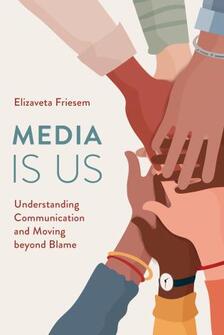
MEDIA IS US:
UNDERSTANDING COMMUNICATION AND MOVING BEYOND BLAME
>>description of chapters<<
ORDER a copy:
Online here or @ 1-800-462-6420
Save 30% off with code RLFANDF30
Free limited PREVIEW available on Google Books!
Media is usually seen as a feature of the modern world enabled by the latest technologies. Scholars, educators, parents, and politicians often talk about it as something people should be wary of due to its potential negative impact on their lives. But do we really understand what media is?
My book argues that, in order to make sense of the modern media, we should explore fundamental principles of human communication. Ideally, this exploration will help us better understand ourselves and others, enhance our empathy, and engage in collaboration that will replace polarization based on blame.
The main ideas developed in the book include:
REVIEW COPIES ARE AVAILABLE! To request a copy, please fill out the form below.
UNDERSTANDING COMMUNICATION AND MOVING BEYOND BLAME
>>description of chapters<<
ORDER a copy:
Online here or @ 1-800-462-6420
Save 30% off with code RLFANDF30
Free limited PREVIEW available on Google Books!
Media is usually seen as a feature of the modern world enabled by the latest technologies. Scholars, educators, parents, and politicians often talk about it as something people should be wary of due to its potential negative impact on their lives. But do we really understand what media is?
My book argues that, in order to make sense of the modern media, we should explore fundamental principles of human communication. Ideally, this exploration will help us better understand ourselves and others, enhance our empathy, and engage in collaboration that will replace polarization based on blame.
The main ideas developed in the book include:
REVIEW COPIES ARE AVAILABLE! To request a copy, please fill out the form below.
REVIEWS AND PRAISES:
You'll understand why media literacy has been called "the new humanities" after reading Elizaveta Friesem's marvelous new book. Through a close look at the nature of human communication, the critical analysis of media, the practice of collaboration, and the power of empathy, Friesem models the kind of self-reflexive stance that is needed to make sense of our social relationships in the complex digital world we inhabit. There's so much depth and wisdom in this book—and it's presented in an accessible and engaging way that will resonate with every reader and every aspect of daily life. What a great contribution this book makes to the field!
— Renee Hobbs, Harrington School of Communication and Media, University of Rhode Island
While searching for the truth, media resembles and competes with criminal trials, especially in cases of public interest. Elizaveta Friesem's book can help diverse scholars and criminal law practitioners like myself understand the semantic aspect of mediated communication as it relates to the construction of meaning. Analyzing media without falling back on blame is the book's best suggestion.
— Gabriel Pérez Barberá, professor, University Torcuato Di Tella, Buenos Aires and University of Córdoba; and federal prosecutor, Argentina
We target modern media for many of the issues of society, often blaming the contemporary communication landscape for much of humans’ woes. In Media Is Us, Elizaveta Friesem expertly argues that this simplifies very complex problems. Friesem brings to light insightful connections between the meanings we make about media, the way humans communicate, and the power imbalances throughout culture. Friesem skillfully presents an excellent and essential idea in our polarized world; we must replace blame with empathy.
— Michelle Ciulla Lipkin, executive director, National Association for Media Literacy Education
You'll understand why media literacy has been called "the new humanities" after reading Elizaveta Friesem's marvelous new book. Through a close look at the nature of human communication, the critical analysis of media, the practice of collaboration, and the power of empathy, Friesem models the kind of self-reflexive stance that is needed to make sense of our social relationships in the complex digital world we inhabit. There's so much depth and wisdom in this book—and it's presented in an accessible and engaging way that will resonate with every reader and every aspect of daily life. What a great contribution this book makes to the field!
— Renee Hobbs, Harrington School of Communication and Media, University of Rhode Island
While searching for the truth, media resembles and competes with criminal trials, especially in cases of public interest. Elizaveta Friesem's book can help diverse scholars and criminal law practitioners like myself understand the semantic aspect of mediated communication as it relates to the construction of meaning. Analyzing media without falling back on blame is the book's best suggestion.
— Gabriel Pérez Barberá, professor, University Torcuato Di Tella, Buenos Aires and University of Córdoba; and federal prosecutor, Argentina
We target modern media for many of the issues of society, often blaming the contemporary communication landscape for much of humans’ woes. In Media Is Us, Elizaveta Friesem expertly argues that this simplifies very complex problems. Friesem brings to light insightful connections between the meanings we make about media, the way humans communicate, and the power imbalances throughout culture. Friesem skillfully presents an excellent and essential idea in our polarized world; we must replace blame with empathy.
— Michelle Ciulla Lipkin, executive director, National Association for Media Literacy Education
INTERVIEWS: